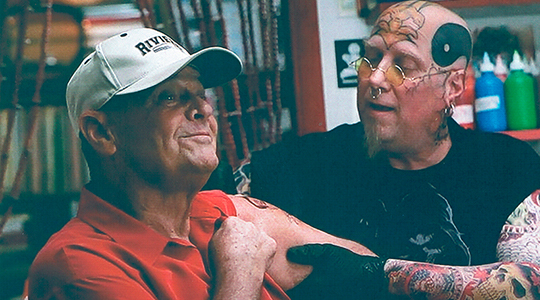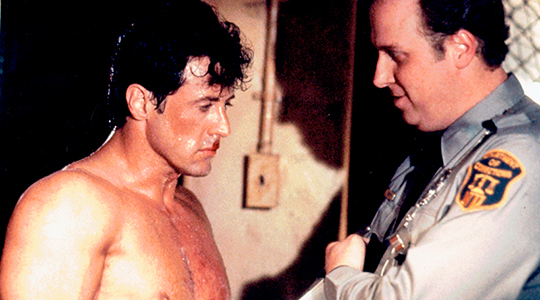The Class
My Approach to Teaching Actors
When I'm around actors who are passionate about chasing the work, I'm my happiest. My favorite places to be are rehearsals, sound stages, theaters, classes and locations. I love actors and acting.
I believe the only way to teach acting is to encourage and nurture my students.
It's so important for actors to be emotionally available and sensitive in our work.
Ideally our emotional life is expressed in a spontaneous and instinctive way. If we worry about being judged by the audience, other actors, or even ourselves (the harshest judge of all), we tend to put on a protective mask.
We need to have a safe place to express our deepest thoughts and feelings in service to our acting. And we need to be able to make mistakes and fall on our face, and then get back to it with enthusiasm and passion.
No actor should ever worry about getting it "right" and doing it "perfectly". No such thing. If we seek to understand and accept who we are, and express that in our work, we will be unique. We will be perfect. Perfectly ourselves, unlike any other. That pursuit needs our truth.
Acting is simple entertainment. We hope we tell a story that will entertain.
I also think at the very highest level of acting, we can move the audience deeply.
These stories that we tell can change someone's life.
A person in the audience might see that story and feel that it's their story; that it spoke to, or challenged a deeply held belief. It's possible that the experience of watching a movie or play or TV show can be a spiritual one.
That is the level of acting that I believe we can all achieve, if we're willing to do the work.
Through our training, on our way to achieving the highest level, the goal is becoming a solid professional craftsperson. And if we're doing our job, the audience is entertained by the story.
If we're determined, disciplined and lucky, we can almost change someone's life.
I think anyone can develop the skills, instincts and imagination to soar as an actor.
It starts with your passion.

"The Bucket List" with Jack Nicholson

"Lock Up" with Sylvester Stallone
How Class Works
I use two cameras in my film acting class. The actors are recorded onto a split screen, so when students watch the recording at home, they can see how they are reacting to their acting partner.
The best acting is when actors have an emotional effect on each other's behavior. That's central to the work I do with students in class.
The on-camera classes also include scene study and cold-reading
We use scenes from films and tv shows.
I select the scenes that actors will work on in each class. The students work on the scenes in that one class, and we don't rehearse the scenes outside of class. We're using the scenes as an acting exercise, we're not trying to polish them up for a performance. There's no pressure to get it right. (Whatever that is)
At the heart of my approach to acting, is the attempt to be our authentic selves when we act. Not trying to be somebody else, but be the true, honest and flawed humans that everyone else in the world is. That takes a little courage. To be willing to be imperfect and human and use our own hearts and minds to tell all the great stories that are written.
When it’s your turn to do the scene, you sit in a chair opposite your partner and you and your partner are both shot in close-up, on a split screen, while you rehearse the scene.
You'll get notes on your work.
Your entire scene and critique are recorded. It's helpful to see how you respond to your acting partner. You get to see clearly how the notes you get, can become a part of your work.
Acting Tools I Teach
Relaxation is at the heart of creating the most authentic and instinctive acting. Stanislavski referred to tension as the "occupational disease" of the actor. Strasberg believed that tension is the greatest enemy of an actor. Tension in an actor blocks the free flow of emotional energy and imagination. We work toward finding an ease in our way of working, a way into that "zone" or "channel" where actors want to be. We learn to identify unwanted tension in the muscles of the body, and learn to let it go. Although there are many ways to relax and release tension, it’s vital that we find an “energized relaxation” that propels us through the story.
On Camera vs. On Stage
Acting on a stage and acting on camera have one basic difference.
On stage we prepare our work to show an audience. Their presence is essential to our work. Every performance is different because every audience is different; the energy from the actors and those watching them feed off each other.
When we prepare our work for the camera, we're not showing anybody anything. We are having a private experience with the other actors in the scene. The same way you'd have a private conversation with someone inside of a closed car, or in a room where you're alone, with no one watching. What happens is that there's a camera spying on us, eavesdropping on our private intimate moments.
If we start to "perform" or "show" what's going on (the way we do on stage), it will look fake. The camera never lies. If we start "acting", then we won't be believed. But, truthful behavior that is simply "witnessed" is what we want.